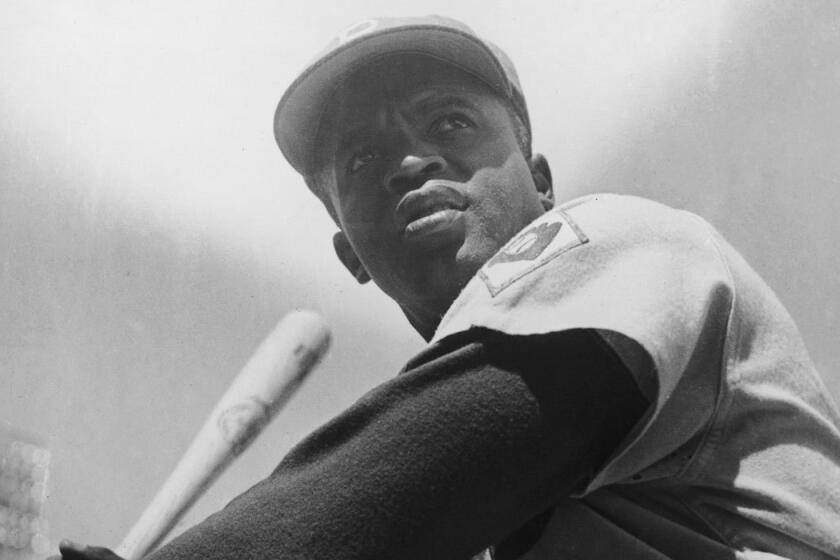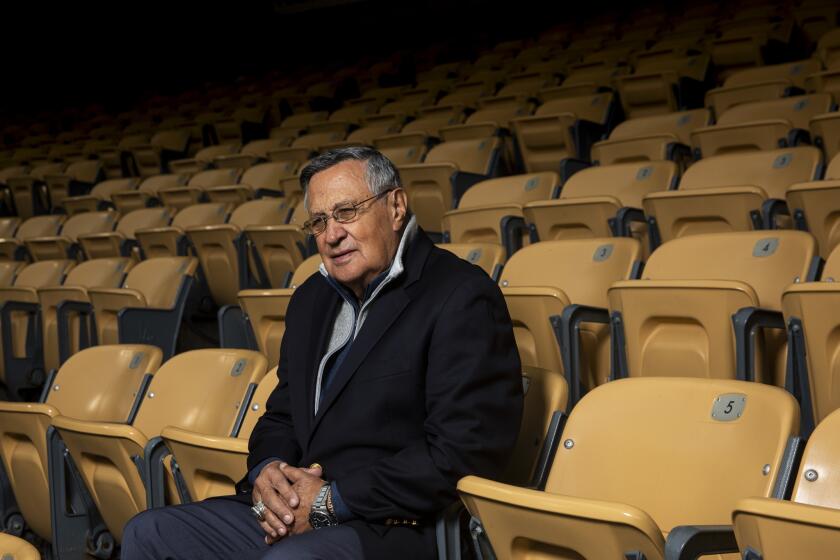Military hero deserves a moment, even if Dodgers can’t give it to him
- Share via
At last, Ken Mallory would be cheered.
After a lifetime of stoic courage, the 95-year-old World War II veteran would finally be properly thanked for his service.
“He was finally going to get his standing ovation,” said his daughter, Judie Miller.
It was going to happen at Dodger Stadium last Saturday, where Mallory was to be honored as the Dodgers’ Military Hero of the Game.
It is the team’s most meaningful nightly tradition. If you’ve seen it, you’ll never forget it.
In the middle of the second inning of every home game, a military hero is escorted onto the field and introduced to thunderous applause. The hero’s accomplishments are read by announcer Todd Leitz, their branch of service’s theme song is played by organist Dieter Ruehleand they bask for several long moments in what is often a long-overdue show of public gratitude.
After the ceremony, the hero usually walks into the stands past the Dodgers dugout, where third baseman Justin Turner has made a tradition of shaking their hand and gifting an autographed baseball. The hero then walks up through the stands amid a gantlet of outstretched hands from fans wanting to congratulate and connect with history.
Last Saturday, in front of what would surely have been a sellout crowd for the first series against the defending World Series champion Washington Nationals, Mallory was finally going to be that hero.
He had planned for it. He bought 15 tickets for his family. He dug out his ribbons and badges. He was going to wear the same uniform he wore while serving as an Army sergeant in both the Pacific and European theaters, a three-year stint that included fighting under General George Patton in the Battle of the Bulge.
“It was a big game, a big crowd, the perfect time to honor my father,” said his son, Jim.
But it wasn’t.
“You’re looking forward to it … then this virus comes along and … boom,” Ken said.
Jackie Robinson’s legacy stretches well beyond baseball, into all facets of life. It’s why we should always celebrate Jackie Robinson Day.
The game disappeared like everything else in the sports world, and with it one of the dwindling chances for Mallory to be publicly remembered.
“We had a real good opportunity there,” he said. “I’m not sure of my chances next time around.”
He is good health. He exercises daily. He drives. In their Bradbury retirement home, he serves as a caretaker for his infirm wife of 68 years, Elizabeth.
Given the toughness Mallory showed in surviving the brutalities of war, here’s guessing he’ll still be going strong when baseball returns, and one day will stand on that field and bathe in a city’s appreciation.
But until then, well, can we take some time to honor him anyway? Right here, right now? Imagine the solemn tones of his Dodger Stadium introduction. Listen to the roars growing louder with each fact on his resume.
“Introducing Sergeant Ken Mallory, Company L, 345th Infantry Regiment, 87th Infantry Division, served from 1943-1945!”
“I never bragged, because what do you brag about?” Mallory said. “I don’t think I’m a hero. I’m just a guy who did his job.”
“He learned about perseverance when he served as water boy for the Pasadena Junior College football team that was led by Jackie Robinson.”
“Being around Jackie, getting to know him, watching how he handled things, that taught me a lot about life,” Mallory said.
“Once he joined the Army, he was in charge of a mortar squad that provided cover and saved the lives of countless infantry riflemen.”
“I never say I killed anybody,” Mallory said. “I tell people I eliminated targets.”
Jaime Jarrin, 84, was set to begin his 62nd season as the Dodgers’ Spanish-language broadcaster. Instead, he is home gorging on SportsNet LA content.
“He remembers marching through the woods in the snow and diving into trenches on top of other soldiers when the firing started.”
“I don’t know if you could say I was scared,” Mallory said. “It was more like, ‘If shells come around, this ain’t the place to be.’”
“In the Battle of the Bulge, he paddled a small boat across the Rhine River in the middle of the night to put his mortar squad into position to protect Allied crossings that led to the eventual Allied victory.”
“About 25 years ago, a guy comes up to me at some event and says ‘Mallory, is that you? I want to shake your hand!’” Mallory recalled. “He said, ‘Back in Germany, you took out a machine gunner and saved my life.’”
Ken Mallory’s powerful voice softened.
“Hearing that, you know, it was kind of nice,” he said.
“Of the 200 men in his original company, only 30 survived the war. After being honorably discharged from the service, Mallory earned a business degree from USC and embarked on a successful life of sales. After traveling the world protecting our country, he settled down in one place, living with his wife in the same Arcadia house for exactly 50 years.”
This is the grand ending, the part where thousands would have stood and cheered and given Ken Mallory the memory of a well-lived lifetime.
He missed all that. But, as it turns out, he felt it.
He couldn’t go to Dodger Stadium Saturday night, but family members brought Dodger Stadium to him.
In a Zoom conference conceived by Stephen Sullivan, whose cousin is Mallory’s grandson, a couple dozen of Mallory’s relatives surprised him by recreating a game atmosphere.
They showed up on his computer screen wearing Dodgers jerseys, holding Dodger dogs, and cheering him as if he were walking through the seats.
”The only thing we couldn’t do was put someone in a red beard and hand him a baseball,” Sullivan said.
Midway through the call, they broke into song.
“Take me out to the ballgame…”
Soon, Ken Mallory was singing along, an inspiration that can outlast any shutdown, a hero forever just doing his job, strong and unflinching and free.
More to Read
Are you a true-blue fan?
Get our Dodgers Dugout newsletter for insights, news and much more.
You may occasionally receive promotional content from the Los Angeles Times.













